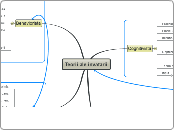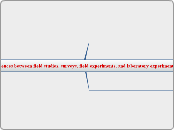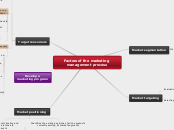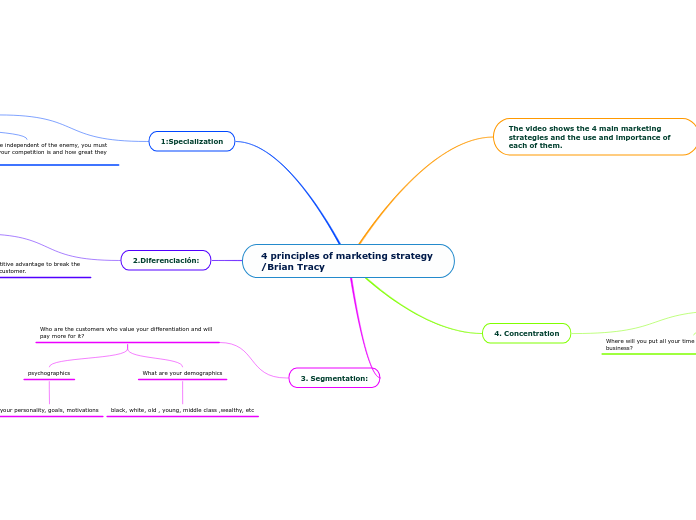Marketing
Postpurchase Cognitions and Behavior
Purchase
Evaluation of Alternatives
Price
Product
Product Mix Decisions
Product Line Decisions
Life-Cycle Management
Branding
New Product Development
Definition, Classification, Types of Market Offerings
Types of Market Offerings
Solutions
true solution will have performance-based pricing models
price typcially higher than of its individual, non-integrated components
implemented, maintained
individualized, customized
combination of integrated goos and/or services (and/or software)
Hybrids
Combination of goods and services (and software) in 1 offering
Bundles
typically lower price than price of individual components
2+ goods/services in 1 offering
(tangible) Goods
Classification
Services
Customer integration
Lack of ownership
Perishability
Variability
Inseparability
Intangability
Goods
Non-Durable Goods
Durable Goods
Industrial Goods
Consumer Goods
Levels
Def. --> Flash cards
Product Management
Potential Interactions
Overview
Attitudes
attitude measurement
Conjoint Measurement
price as product feature (!)
decompositional
Mathematical-statistical method for calculating utility values
relative importance = raw importance / total
total = sum(raw importances)
raw importance ("color") = max(part woths) - min(part worths)
part worth("black") = (average - min) / (max - min)
always 0 < part worth < 1
average("black") = sum(ranking)/#"black"
test person ranks them
matrix with all possible product combinations (color, PS, model, price)
Fishbein-Model
price typically disregarded
simple, easy to use
Sum of all individual attributes
compositional
multi-attribute attitude
components
affective component
emotions
feelings
cognitive component
ideas
beliefs
thoughts
attitude = person's evaluation of an object
Introduction
evaluation difficult if ...
uncertainty
criteria difficult to evaluate
many criteria
many alternatives
for each product --> evaulate all criteria to one global judgement
after collecting information about alternatives --> now evaluate them to set up preferences
bundle
price is lower than each component
e.g. Happy Meal
two or more products
d
Information Search
Online Communications
Evaluating Success of Promotions on the Internet
Disadvantages
Advantages
Internet is the first commercial medium in which it is possible to measure consumer response (e.g. view, click, sale and lead), not just assume it.
Cost per Aquisition (CPA)
e.g. = 0,30€ / 0,5556 = 0,54 €
= CPC("Cost Per Click") / CR
important for controlling etc.
Conversion rate (CR)
e.g. 50.000 booked a flight --> = 50.000 / 90.000 ? 55,56%
= # new customers / # new visitors
qualit of traffic
Click-through rate (CTR)
= 90.000 / 4.500.000 = 2 %
= CT / PI
proportion of users viewing ads and click on them
click-through (CT)
e.g. 90.000 clicks on the ad
every time when user clicks on advertisment
Page impressions (PI)
e.g. 4.500.000
1 person viewing 1 web page
Impact to overall financial contribution
price comparison, display and EPR ahave minor impact
decision makes rate SEM and Affiliate Marketing with highest impact on overall financial contribution to the companies' business
Online Marketing Instruments
Affiliate Marketing
not only clicks but also leads and sales are measured!
e.g. Sport1/Sky, sueddeutsche.de/amazon
one website linking to another for a certain fee
E-Mail Marketing
Social Media Marketing
Blog Marketing
Viral Marketing
Strategy that motivates customers to pass along a marketing message to friends or colleagues in order to generate “word of mouth”
click-pattern on search engine result pages (SERP's)
What is influencing SEO rankings?
query ranking factors
page ranking factors
ranking factors
Search Engine Marketing and Search Engine Optimization
Digital Asset Optimization (DAO)
Search Engine Optimization (SEO)
Search Engine Marketing (SEM) == paid Ads above the search results
paid Ads above the search
links to other websites
current content
bit on words
based on clicks not shown
Communications
Evaluationg Success of Communications
Brand Success
Media Evaluation
Elaboration Likelihood Model (ELM)
Multichannel shopping
customers use different / multiple channels to gather information and purchase products
growing importance
Above / Below the line (ATL/BTL)
BTL is marketing via methods other than mass media
exhibition
sponsorship
email promotion
ATL is marketing via the mass media
radio
tv
cinema
magazine
newspaper
five major promotion tools
direct marketing
public relations
personal selling
sales promoting
advertising
information sources
external
what sources do you trust the most? email from friends, product ratings by other customers, portal/search engines
where to get information? search engines, online rating systems, discussion forums...
takes time & effort
internal
Need Recognition
Market Segmentation
Developing a Positioning Strategy
Selecting Target Segment(s)
Determing Segment Attractiveness
Profile Development
Segmentation Variables - Organizational Markets
Buying Center Aproach
Members
Buyer
Approver
Decider
Influencer
GateKeeper
User
Segmenatition Variables - Consumer Markets
psychographic variables
--> use socio-demographic variables as proxies
hard to get
very good in prediction
socio-demographic variables
-
can be misleading
+
easy to get
Definitions
Untertopic
Positioning
Targeting
--> 4 different P's for each group
"How can we adress the for us relevant consumer group?"
Market segmentation
"How can we group consumers?"
Qualitative and Quantitative Marketing Research
Delphi Method
Strengs & Weaknesses
Längsschnitt
expected: variance of answers goes down --> "agreement"
2. round : survey + infos of 1. round
1. round : survey
from all over the world
"Panel of Experts"
In-Depth Interviews
Laddering: "Why?"-"Why?"-"Why?"
Focus Groups
Strengths & Weaknesses
Moderator Guidelines
Characteristics
Purpose
ERM :)
What are the consumers' needs?
Marketing Research and Buyer Behaviour
Summary
The Buyer's Decision Process
Marketing Research
Forschungsdesign aus Empirische Methoden :) (hier nicht weiter ausgeführt)
same models and methods as consumer behaviour researchers
but with the purpose of providing decision-relevant information on marketing problems
A General Model of Consumer Behavior
different types of buying decision making
impulsive buying
habitual buying
limited buying
extensive buying
lighten the "black box"
difficult to predict the consumer's buying behaviour
Marketing Basics
Relationship Management Basics
3 Rs <--> 4 Ps
Recovery
Retention
Recruitment
focussed on relation, maintaining and creating services
Value of Company = Value of Customer Base
Customer Lifetime Value
Development of Profit
CUSTOMERS
Definition
The Four "Ps" of the Marketing-Mix
focus on individual products that should be sold to an end customer, using the 4 Ps to positioning the product right so it will be sold
PRODUCTS
business model : factory --> phyiscal goods --> sold directly or retailer
Extension to 7 Ps
Physical evidence
People
What about Services?
Process
"What PRODUCT at WHICH PRICE is HOW COMMUNICATED ind which CHANNELS?"
What is ist and what not?
Marketing as a Dual Character
Marketing as a Managerial Function (“Marketing Management”)
Marketing is getting more and more analytical
In reality: Marketing Department vs. Sales Department
Marketing (incl. Sales) Department for selling
Marketing as a Leadership Philosophy (“Strategic Management/ Marketing”)
"Marketing must be lived and breathed"
Marketing is not only for Profit-Organisations!
Problem: SWOT-Analyse very difficult and often not fitting since NPOs have no buyers (--> stakeholders instead)
SWOT Analysis as Strategic framework
BCG Matrix
motivation to make strategic decision about future strategic action
very general, applied to many levels
Internal Analysis: Strengths & weaknesses
inside of marketing area
networks
CR
image
brands
products
outside of marketing
financial strengths
knowledge, experience
HR Management
External Analysis (Macro & Micorenvironment): Opportunities & Threats
Microenvironmental analysis
laws, governments
Porter's Five Forces
The role of marketing (research) is to provide information for a managerial decision
--> guiding question: "How attractiv is a given market?"
Marketing & Market Research supports this
Why Should the Entire Organization “Live” Marketing?
times changed
80' - today: Marketing Orientation
Slogans: "WE are family", "WE love tou entertain YOU", "WIR sind es UNS wert", "IHR Ziel ist UNSER Weg"
Assumption: Achieving organizational goals depends on determining the needs and wants of target markets and delivering the desired products, services and solutions more effectively and efficiently than competitors do
lots of competition, supply >> demand --> engage customers
Selling Orientation
Organizations should therefore engage in hard selling!
Assumption: Consumers will not buy enough of the organization’s products unless the organization undertakes a large-scale selling and promotion effort.
70's: product orientation
Slogans: "Alles Gute aus Hollywood", "Führend im Service an Board", "The world's favourite airline"
Organizations should therefore devote their energy to making continuous product improvement.
Assumption: Consumers will favor products that offer the highest quality, performance and features.
consumer more money --> buy higher quality
50's, 60's: production orientation = production orientation
Management should therefore focus on the improvement of production (and distribution) efficiency.
Assumption: Consumers will favor products that are available and highly affordable.
strategic levels / decisions
"mindset"
"put the customer to the center"
Marketing as Exchange
can be about money / education / degreees
"Marketing is about managing an exchange relationship"
Definition Marketing
value for cutomers
exchange offerings
Why is Marketing so critically important in these days?
in most industries: overproduction
--> supply > demand
--> customers orientation == success since --> customer in the driver's seat
--> competition
supply < demand
"Marketing not so important"
Where would/should Marketing start?
customers
right at the beginning --> Market research
Characteristics:
customer-oriented
long-term-focussed
***









